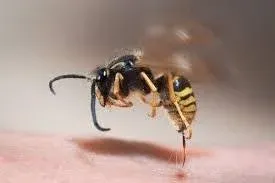Getting stung by a wasp can be painful, itchy, and alarming. The burning sensation, redness, and swelling that follow are caused by venom injected into the skin. While medical treatment is necessary in severe allergic cases, most stings can be managed at home with simple methods. This article explores the most effective natural anti inflammatory remedies for wasp stings to help you heal faster and feel more comfortable.
Why Wasp Stings Cause Inflammation
When a wasp stings, it injects venom containing toxins that trigger your immune system. This leads to:
Pain from nerve irritation
Redness due to increased blood flow
Swelling as fluid builds up in the tissues
Itching from histamine release
The body’s response is natural, but it can be uncomfortable. That’s why finding natural anti-inflammatory remedies for wasp stings is so helpful.
First Aid Before Using Natural Remedies
Before applying any home remedy, take these quick first aid steps:
Wash the area with mild soap and water.
Apply a cold compress or ice pack for 10–15 minutes to reduce swelling.
Avoid scratching to prevent infection.
Check for allergic reactions such as difficulty breathing, dizziness, or swelling of the face and throat. If these occur, seek emergency medical help immediately.
Once first aid is complete, you can use natural remedies to ease inflammation.
Top Natural Anti-Inflammatory Remedies for Wasp Stings
1. Aloe Vera Gel
Aloe vera is one of the best natural anti-inflammatory remedies for wasp stings. Its cooling gel reduces redness, swelling, and pain.
Apply fresh aloe vera gel directly to the sting.
Reapply every few hours for best results.
2. Honey
Honey is both anti-inflammatory and antibacterial. It helps reduce swelling and lowers the risk of infection.
Dab a small amount of raw honey on the sting site.
Cover lightly with a bandage and leave it on for 30 minutes.
3. Baking Soda Paste
Baking soda helps neutralize venom and calm irritation.
Mix 1 tablespoon of baking soda with a few drops of water.
Apply as a paste to the sting and rinse after 20 minutes.
4. Apple Cider Vinegar
Apple cider vinegar can break down venom and relieve discomfort.
Soak a cotton ball in apple cider vinegar.
Place it on the sting site for 10 minutes.
5. Essential Oils
Certain essential oils provide natural relief.
Lavender oil: reduces pain and inflammation.
Tea tree oil: antibacterial and soothing.
Chamomile oil: calms itching and swelling.
Dilute essential oils with a carrier oil (like coconut oil) before applying.
6. Turmeric Paste
Turmeric contains curcumin, a natural anti-inflammatory compound.
Mix turmeric powder with water or honey to make a paste.
Apply to the sting and leave on for 15–20 minutes.
7. Cold Compress with Witch Hazel
Witch hazel has natural astringent and anti-inflammatory properties.
Soak a cotton pad with witch hazel and press gently on the sting.
When to See a Doctor
While natural remedies help in most mild cases, seek medical help if you notice:
Difficulty breathing or swallowing
Severe swelling spreading beyond the sting site
Nausea, vomiting, or dizziness
A history of allergic reactions to stings
These may indicate a serious allergic reaction (anaphylaxis), which requires immediate treatment.
Preventing Future Stings
The best remedy is prevention. You can reduce your chances of getting stung by:
Wearing light-colored clothing outdoors
Avoiding strong perfumes and scented lotions
Keeping food and drinks covered outside
Staying calm and slowly walking away if a wasp is nearby
Final Thoughts
Using natural anti-inflammatory remedies for wasp stings can help ease pain and swelling without harsh chemicals. Aloe vera, honey, baking soda, and essential oils are simple, effective options you can use at home. Always combine these remedies with proper first aid and seek medical care if symptoms worsen or if you have a severe allergy.






